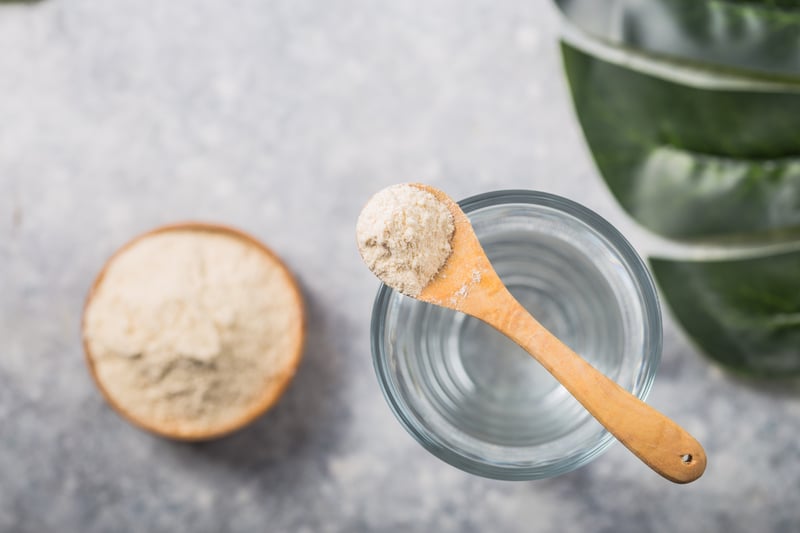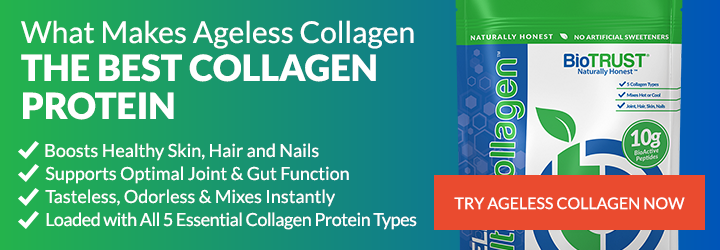Liquid vs Powder Collagen: Which is Better For You?

If you have yet to add collagen to your nutrition plan, what are you waiting for? While it may come across as just another health trend, collagen appears to provide a wealth of benefits from improved gut health to smoother, younger-looking skin, to more flexible joints to greater recovery from exercise. If you’re already sold on the benefits of collagen, you may be wondering which is better: liquid vs. powder collagen. After all, there are a lot of options available.
What is Collagen?
As the most abundant protein in the body, collagen quite literally is the glue that holds us together. It’s found in our muscles, our blood vessels, our connective tissues, and more. It’s needed for skin, hair, nail health; joint health; gut health; and more. 1,2
While the body produces collagen, its ability to do so decreases as we age. And this reduced production starts as early as our 20s. Although it’s found in some foods such a bone broth, it’s difficult to get the amounts needed for benefits.
That’s where supplements come in. Fortunately, collagen supplements are readily available as liquids, powders, and even pills.
Liquid vs. Powder Collagen
Two of the top ways to consume collagen are through liquid vs. powder collagen supplements. Each one has its own set of advantages and disadvantages.
Liquid Collagen
Liquid collagen supplements are gaining in popularity, especially for people who are on the go and just want a convenient form. Liquid collagen is easily absorbed and comes in both flavored and unflavored forms. You won’t need to mix it in anything, and it may also help you get additional hydration.
Unfortunately, your options with liquid collagen are also somewhat limited. If you don’t like the flavor, you can’t just add additional ingredients as you can with powder versions. So, you may have to search to find a somewhat palatable flavor. In addition, some brands claim that liquid collagens have improved bioavailability. However, little evidence exists for this claim, and hydrolyzed collagen powder is easily absorbed and readily available to the body.
Powder Collagen
Collagen powder is just as it sounds: a white powder that dissolves in liquid. However, because of its form, powder collagen does take an extra step for prep and planning because it needs to be mixed with something.
Fortunately, however, a high-quality hydrolyzed collagen protein supplement mixes well in just about any liquid—from a morning coffee, tea, or smoothie to oatmeal, yogurt, omelets, soups, sauces, and baked goods. Often, it can be stirred in with little to no effect on the taste or texture, and it dissolves well in warm and cold foods and beverages.
What’s more, powder hydrolyzed collagen (also referred to as peptides) is easily broken down and absorbed by the body, so it’s typically better tolerated than some other types of protein powders. It’s easy to see why powder collagen is so popular: It’s versatile, is virtually tasteless (depending on the brand and flavor), and gives you the freedom to choose the best way to consume it for your needs.
BREAKING: Forget Taking Collagen, Try This 21-Second Trick for Healthier Skin & Hair Instead
Other Collagen Forms
That said, not all collagen powders are created equal, and some mix better than others. In addition, some have a stronger, more intrusive flavor, so it’s important to find a quality brand.
Two other popular forms of collagen include pills and whole food forms. Pills offer a convenient, portable, and flavorless option. Unfortunately, the serving size is limited and collagen pills can be tough to swallow (due to their size), and they are less easily absorbed.
You can also make up a batch of bone broth to use in soups and stews. This natural source of collagen provides a wealth of nutrients. Unfortunately, it offers less collagen than any other form and is a fairly inefficient way to consume collagen.
In addition, to enjoy the benefits of collagen, it’s recommended it be consumed daily, and it can be difficult to consume bone broth every day. Because collagen powders are more concentrated, they may also provide greater benefits as well as flexibility.
Types of Collagen Peptides
What form of collagen (liquid vs. powder vs. pill vs. whole food) isn’t the only important consideration. Many collagen supplements provide only one or two types of collagen peptide. Yet, there are five key types of collagen, each of which offers different benefits.
Types I and III are found in hydrolyzed collagen peptides from cattle or fish, and they have wide-ranging benefits. Type V can be found in eggshell membranes and work with types I and III to optimize skin health. Type X is also found in eggshell membranes but is more difficult to find in supplementation. This rare collagen type can be especially vital for healthy bones.
To provide the greatest benefits, BioTRUST’s Ageless Multi-Collagen provides all five different types—in scientifically supported proportions—to provide powerful results. To complete the formula, it also provides a naturally fermented form of tryptophan to make it a complete protein. This is often missing from common collagen supplements, liquid or powder.
Liquid vs Powder Collagen: Recap
When it comes to collagen supplementation, quality hydrolyzed powders offer convenience, flexibility, and effectiveness. Liquid collagen products can also offer benefits if you prefer an on-the-go drink.
Remember, however, that not all collagen supplements are created equal. It’s important to look for a quality hydrolyzed product for improved bioavailability. To enjoy more significant benefits, it’s also worth seeking out a product that provides a range of collagen types to support your body from head to toe. Finally, make collagen part of your daily diet as effects diminish if you no longer use it.






